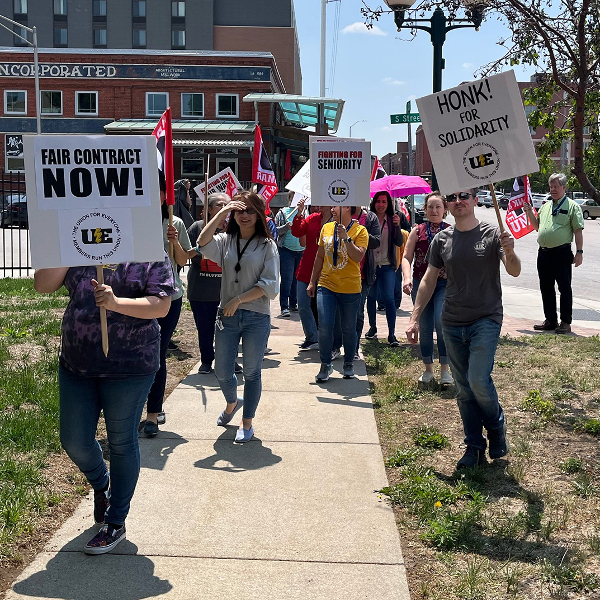USCIS Service Center workers at UE Locals 208, 808, and 1008 ratified new three-year agreements with federal contractor ITC Federal in June. Their union contracts cover nearly one thousand federal contract workers who process nonimmigrant visa petitions for USCIS in Essex Junction, VT (208), Lincoln, NE (808), and Laguna Niguel, CA (1008).
Amid the threat of coming layoffs, the locals united in an aggressive, coordinated contract fight, winning massive economic gains and beating back all of ITC’s concessionary demands.
ITC has employed the members of Local 808 at the USCIS Nebraska Service Center since 2020. USCIS expanded the company’s contract to include Local 208 and 1008 members at the Vermont & California Service Centers effective February 1, 2023. For the first time since they’d organized, all three job sites shared a common employer. The locals eagerly seized on the opportunity this presented.
They began coordinating efforts in January when Locals 208 and 1008 jointly bargained with ITC to secure four-month bridge contracts in advance of ITC’s taking over the contracts in Vermont and California. The bridge agreements preserved their existing union contracts while also providing additional paid time off (PTO) to offset what would be lost or paid out to employees by the outgoing contractor.
The three locals then demanded coordinated bargaining with ITC over new three-year agreements. Locals 208, 808, and 1008 joined each other at the table—first in Vermont, then Nebraska, then California. ITC had requested virtual bargaining, which the locals refused. They insisted instead that in-person negotiations take place for several days near each job site to allow all UE members covered by the contracts the ability to attend and observe.
The locals presented unified demands while still maintaining three separate agreements. This allowed mirror proposals on most topics while accounting for proposals on topics unique to each location. The union’s core bargaining platform included: no concessions; elimination of point-based attendance policies; full employee control over when and whether to use PTO to cover absences; enhanced flexibility in work schedules; and historic wage increases to account for historic inflation.
Boss’s Attempts to Divide Workers Backfires
The threat of layoffs loomed large during negotiations, with USCIS having recently announced a multi-year plan to automate much of the work currently done by union members. ITC attempted to use this threat to both divide members and to impose a back-door quota system. The company proposed eliminating seniority during layoffs and instead selecting employees for layoff based on their ability to meet company-determined performance standards, a method the company maintained was “fairer to the best employees.”
ITC further attempted to divide UE members by job classification. The company offered the biggest raises to those already working in the highest-paid positions, including those held by the majority of bargaining committee members. Their efforts at division backfired.
According to Local 1008 Third Shift Chief Steward Pam Baguyos, “the membership saw through ITC’s plan of dividing us by proposing a wage increase that is not the same for all classifications and imposing a layoff system based on productivity instead of seniority. It did the opposite. Almost half of our members are relatively new, but they stood behind seniority because they understood that it’s not about that. It’s about ITC imposing quotas without saying that they are.”
Local 1008 President Joel Faypon added, “In the company’s proposals to eliminate seniority and give disparate raises — with the lowest-paid members being offered the lowest percentage — we saw that the company was pitting members with high seniority against newer members and lower classifications against higher ones. That drove a high participation rate in our shop actions at every escalation.”

Local 808 lunchtime picket in Lincoln, NE.
To beat back the company’s unacceptable demands, and to ensure that all UE members would receive substantial wage increases, the locals waged a textbook contract support campaign. They held regular union t-shirt days, posted “Seniority Rules!” signs at their desks, published speakout leaflets, took group photos, and collected 700 member signatures on a petition opposing ITC’s layoff proposal. At Local 808, the members held twice-daily lunchtime pickets during the last weeks of bargaining while Local 1008 members held mass rallies during the final negotiation sessions.
The contract support campaign culminated in California, where the high cost of living in Orange Co. and ITC’s failure to offer a meaningful wage increase led to 97 percent of Local 1008 members signing a strike pledge. Local 1008 members then voted overwhelmingly to authorize a strike while the bargaining committee was in session on the final day of negotiations. Local 208 Chief Steward Kelly Levick said, “the actions that members took were vital in securing a fair contract. ITC needed to see what was at stake and just how much people were willing to do to protect what was important to them.”
Largest Economic Gains in Locals’ History
The campaign was effective. The final agreements include some of the largest economic gains in the history of the three locals, with the greatest wage increases going to the lowest-paid classifications. By the end of 2025, more than two-thirds of members covered by the contracts will receive increases totaling at least 25 percent, with higher-paid positions gaining at least 15 percent over the same period. Wage increases for Locals 208 and 1008 are retroactive to February 1 and all three locals will receive an additional wage increase in December 2023.
The locals also won increases to their Health & Welfare (H&W) earnings. Contractor employees receive an H&W wage that is used to pay for the cost of their insurance premiums. These funds are granted in place of a typical employer contribution to benefits. The locals won an H&W rate of $5.91/hr., a union advantage of $1.34 above the federally-mandated minimum. More importantly, they secured the right to receive any of their unused H&W funds as additional cash in their paychecks. Employees may now waive costly employer-sponsored health insurance without proof of coverage and use their H&W earnings to purchase more affordable plans on the Affordable Care Act marketplace.
The new agreements eliminate the attendance occurrence systems. Members may no longer receive discipline for absences covered by PTO and now have a five-minute grace period for tardies. Members have full discretion over the use of their PTO, allowing them to elect to use unpaid leave for unscheduled absences and to save their PTO balances for planned time off.

Local 208 Contract Support Committee in Essex Junction, VT.
At Locals 208 and 808, the locals established voluntary four-day work schedules to be granted by seniority to as many employees as there is space to accommodate. Local 208 members can create temporary flexible schedules for a period of up to four months at a time. At all three locals, members can now flex work hours during the same work week in lieu of using PTO. All locals gained Juneteenth as an additional paid holiday and Local 808 members joined Local 208 and 1008 members in receiving three paid personal days each year.
The agreements contain no concessions. Seniority remains the sole factor in determining layoffs. In fact, the agreements expand bumping rights and increase the recall period from 12 to 24 months.
Bargaining committee members credit coordinated bargaining for much of their success. Local 808 Steward Greg Baker said, “Working with 1008 and 208 was amazing! They brought the strength needed for Nebraska to reach a fair contract. Seeing what they did made us rethink how 808 had functioned during past negotiations.”
According to Levick, “bargaining together helped motivate and inspire our local to participate in shop actions. As our members saw the other locals’ courage and actions, they discovered their own voice and strength.”
Local 1008 Vice President Fred Hatef observed, “it was great working with the other Service Centers to build solidarity among members from coast to coast. Coordinated bargaining requires coordinated actions, which only strengthens us all.”
The Local 208 bargaining committee consisted of President Christine Brown, Chief Steward Kelly Levick, Terri Lee, and Bonnie Whitcomb. The Local 808 bargaining committee consisted of President Eric Franke, Chief Steward Victoria Hilton, Financial Secretary Dawn Meyer, Greg Baker, Kylee Beeck, and John Reinert. The Local 1008 Committee consisted of Vice President Fred Hatef, Chief Steward Robert Holland, Financial Secretary Liz Perez, Member at Large Michelle Hipolito, and Steward Jesus Sandoval. They were assisted by UE International Representatives Zachary Knipe and Fernando Ramirez.
